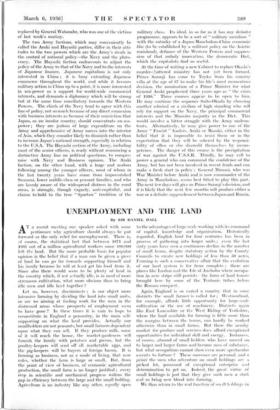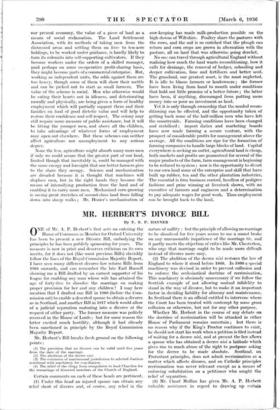UNEMPLOYMENT AND THE LAND
By SIR DANIEL HALL
Let us, however, discriminate ; is our object more intensive farming by dividing the land into small units, or are we aiming at finding work for the men in the distressed areas whose prospects of employment seem to have gone ? In these times it is vain to hope to reconstitute in England a peasantry, in the main self- supporting on what the land provides. Actually our smallholders are not peasants, but small farmers dependent upon what they can sell. If they produce milk, some of it will reach the house, the market-gardeners will furnish the family with potatoes and greens, but the poultry-keepers will send off all marketable eggs, and the pig-keepers will be buyers of foreign bacon. It is farming as business, not as a mode of living, that now rules, whether the farm is large or small. But, from the point of view of business, of economic agricultural production, the small farm is no longer justified ; every step in scientific and - mechanical progress widens the gap in efficiency between the large and the small holding. Agriculture is an industry. like any other, equally open to the advantages of large-scale working with its command of capital, knowledge and organisation. Historically regarded, English land for four centuries has been in process of gathering into larger units ; even the last sixty years have seen a continuous decline in the number of small farms, despite statutory action by the County Councils to create new holdings of less than 50 acres. Farming is such a conservative affair that the evolution of our land system is far from complete ; there are places like Laxton and the Isle of Axehohn where occupa- tion in acre strips still persists--the form of land tenure brought here by some of the Teutonic tribes before the Roman conquest.
Again, England is so varied a country that in some districts the small farmer is called for ; Westmorland, for example, affords little opportunity for large-scale cultivation or the use of machinery. Districts again like East Lancashire or the West Riding of Yorkshire, where the land available for farming is little more than the margins between the towns, can hardly be worked otherwise than in small farms. But there the nearby market for produce and services does afford exceptional opportunities for individual skill and energy. Instances, of course, abound of small holders who have moved on to larger and larger farms and become men of substance, but what occupations cannot. show even more spectacular ascents to fortune ? These successes are personal, and a priori the men who adventure on small holdings are a picked lot, possessed of exceptional enterprise and determination to get on. Indeed, the great virtue of small holdings is just that they give such men a start and so bring new blood into farming.
We thus return to the real function of small holdings in our present economy, the value of a piece of land as a means of social reclamation. The Land Settlement Association, with its methods of taking men from the distressed areas and settling them on five- to ten-acre holdings, to be worked under guidance, is hardly likely to . turn its colonists into self-supporting cultivators. If they become workers under the orders of a skilled manager, paid perhaps on some co-operative profit-sharing basis, they might become parts of a commercial enterprise. But, working as independent units, the odds against them are too heavy, though some of them will show their mettle and can be picked out to start as small farmers. The value of the scheme is social. Men who otherwise would . be eating their hearts out in idleness, and deteriorating morally and physically, are being given a form of healthy employment which will partially support them and their families on food of good dietetic value and will help to restore their confidence and self-respect. The colony may still require some measure of public assistance, but it will be fitting the younger men, and above all the children, to take advantage of whatever forms of employment may open out elsewhere. But these schemes can neither affect agriculture nor unemployment to any serious degree.
None the less, agriculture might absorb many more men if only we could secure that the greater part of our land, limited though that inevitably is, could be managed with the same energy and foresight that our better farmers give to the share they occupy. Science and mechanisation are dreaded because it is thought that machines will displace men, but in the right hands they become the means of intensifying production from the land and of enabling it to carry more men. Mechanised corn-growing is saving great stretches of second-class land from falling down into sheep walks ; Mr. llozier's mechanisation of eow-keeping has made milk-production possible on the high downs of Wiltshire. Poultry -share the pastures with the cows, and the soil is so enriched that the plough can return and corn crops are grown in alternation with the pasture, all on land that was otherwise going derelict.
No one can travel through agricultural England without realising how much the land wants reconditioning, how it ealls for drainage, the removal of hedges, subsoiling and deeper cultivation, lime and fertilisers and better seed. The grassland, our greatest asset, is the most neglected. It is idle to blame farmers or landowners ; the former have been living from hand to -mouth under conditions that hold out little promise of a better future ; the latter have been, if inything, discouraged from putting more money into so poor an investment as land.
Yet it is only through ownership that the needed recon- ditioning can _be effected, and the opportunity taken of getting back some of the half-million men who have left the countryside. Farming conditions have been changed and stabilised ; import duties and marketing boards have now made farming a secure venture, with the prospect of considerable profits for management above the average. All the conditions are ripe for the formation of farming companies to handle large blocks of land. Capital everywhere is seeking an outlet, agricultural land is-cheap, both markets and profits are guaranteed for several .of the major products of the farm, farm management is beginning to be reduced to system ; now is the opportunity to divert to our own land some of the enterprise and skill that have built up rubber, tea and the other plantation industries. The essential is firm business control, heedless of pedigree fashions and prize winning at livestock shows, with an executive of farmers and engineers and a determination to pay adequate wages for good work. Thus employment can be brought back to the land.

















































 Previous page
Previous page